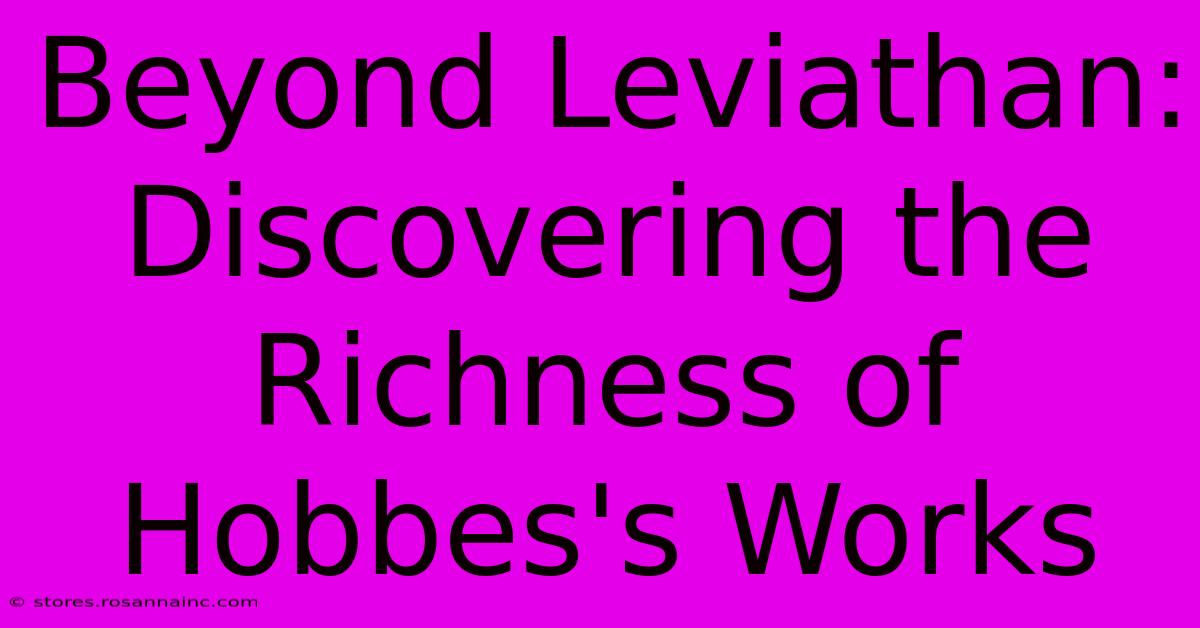Beyond Leviathan: Discovering The Richness Of Hobbes's Works

Table of Contents
Beyond Leviathan: Discovering the Richness of Hobbes's Works
Thomas Hobbes, the 17th-century English philosopher, is often remembered solely for his magnum opus, Leviathan. This monumental work, with its chilling depiction of the state of nature and its advocacy for a powerful sovereign, has cemented Hobbes's place in the history of political thought. However, to confine Hobbes to Leviathan alone is to drastically underestimate the breadth and depth of his intellectual contributions. This article explores the richness of Hobbes's other works, revealing a thinker far more nuanced and complex than the simplistic "author of Leviathan" label suggests.
Beyond the State of Nature: Exploring Hobbes's Diverse Writings
While Leviathan undoubtedly represents the pinnacle of Hobbes's political philosophy, his other writings offer invaluable insights into his broader intellectual project. These works illuminate the foundations of his political thought, revealing the interconnectedness of his views on human nature, knowledge, and morality.
Human Nature and the Limits of Reason:
Hobbes's understanding of human nature, central to Leviathan, is further explored in works like Human Nature and De Corpore. These texts delve into the mechanics of human perception, reasoning, and emotion, providing a crucial context for understanding his political arguments. He meticulously examines the limitations of human reason, highlighting its susceptibility to passion and self-interest. This understanding is not simply a pessimistic view of humanity; it’s a pragmatic assessment informing his political prescriptions. He didn't believe in inherent goodness; his political philosophy sought to manage the inevitable conflicts arising from human nature.
The Importance of Science and Method:
Hobbes was a staunch proponent of the scientific method, a perspective strongly reflected in De Corpore, De Homine, and De Cive. He believed that a systematic, geometric approach to knowledge, akin to the methodology of Euclid, could be applied to the study of both the physical and political worlds. This emphasis on method, and his desire for a unified, systematic understanding of the universe, underscores the philosophical underpinnings of his political project. He attempted to construct a political theory grounded in a scientific understanding of human nature and society.
Moral and Political Philosophy in De Cive:
De Cive (Citizen), predating Leviathan, presents a more concise and systematic exposition of Hobbes's political philosophy. It serves as a valuable stepping stone to understanding the complexities of Leviathan, offering a clearer articulation of his arguments concerning the social contract, the nature of sovereignty, and the rights of individuals within a commonwealth. While Leviathan expands on these themes with greater detail and rhetorical flourish, De Cive provides a more streamlined and accessible entry point to Hobbes's core ideas.
The Literary and Rhetorical Genius of Hobbes:
It's crucial to appreciate Hobbes's masterful command of language and rhetoric. Leviathan, in particular, is a work of literary art, using powerful imagery and compelling arguments to convey its message. Analyzing his rhetorical strategies reveals a deliberate attempt to persuade his readers, highlighting the persuasive dimension of his political thought beyond its purely philosophical aspects. His style is often characterized as both clear and evocative, making his works accessible and engaging despite their complex subject matter.
The Enduring Relevance of Hobbes's Thought
Hobbes's works remain relevant today, offering valuable insights into perennial political and philosophical questions. His analysis of human nature, power, and the state continues to fuel debate among scholars and policymakers. His concern with the fragility of social order and the dangers of unchecked power is especially resonant in the contemporary world.
Keywords: Thomas Hobbes, Leviathan, De Cive, De Corpore, De Homine, Human Nature, Political Philosophy, Social Contract, State of Nature, Sovereign, Scientific Method, 17th Century Philosophy, English Philosophy, Political Theory
Conclusion:
To understand Hobbes fully, one must venture beyond the imposing shadow of Leviathan. Exploring his other writings reveals a remarkably rich and complex thinker, whose influence extends far beyond his most famous work. By engaging with the entirety of his oeuvre, we gain a deeper appreciation for his enduring contributions to political philosophy and the scientific understanding of the human condition. His work continues to inspire debate and discussion, securing his place as one of history’s most influential and enduring thinkers.

Thank you for visiting our website wich cover about Beyond Leviathan: Discovering The Richness Of Hobbes's Works. We hope the information provided has been useful to you. Feel free to contact us if you have any questions or need further assistance. See you next time and dont miss to bookmark.
Featured Posts
-
Barkley Leads Nfl In Rushing
Feb 10, 2025
-
Saquon Barkley Celebrates 28
Feb 10, 2025
-
Super Bowl 2025 Eagles Triumph Over Chiefs
Feb 10, 2025
-
Johnson Postpones Retirement After Super Bowl
Feb 10, 2025
-
Beyond The Name The Alluring World Of Satanic Leaf Tailed Geckos
Feb 10, 2025
